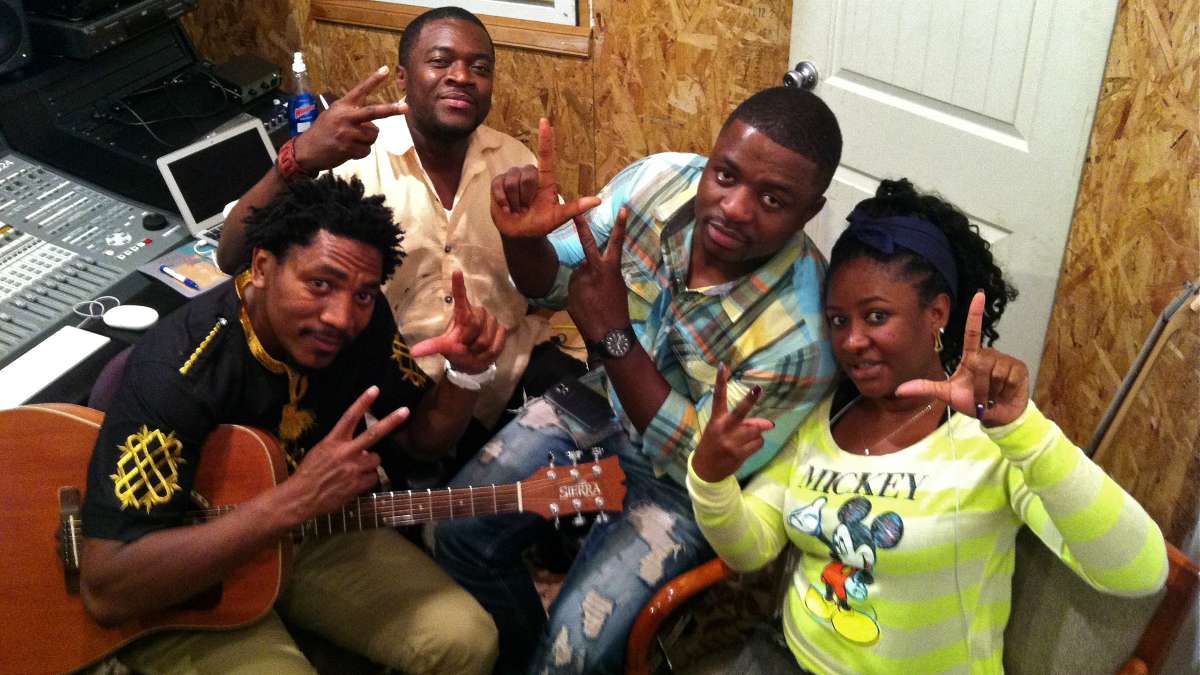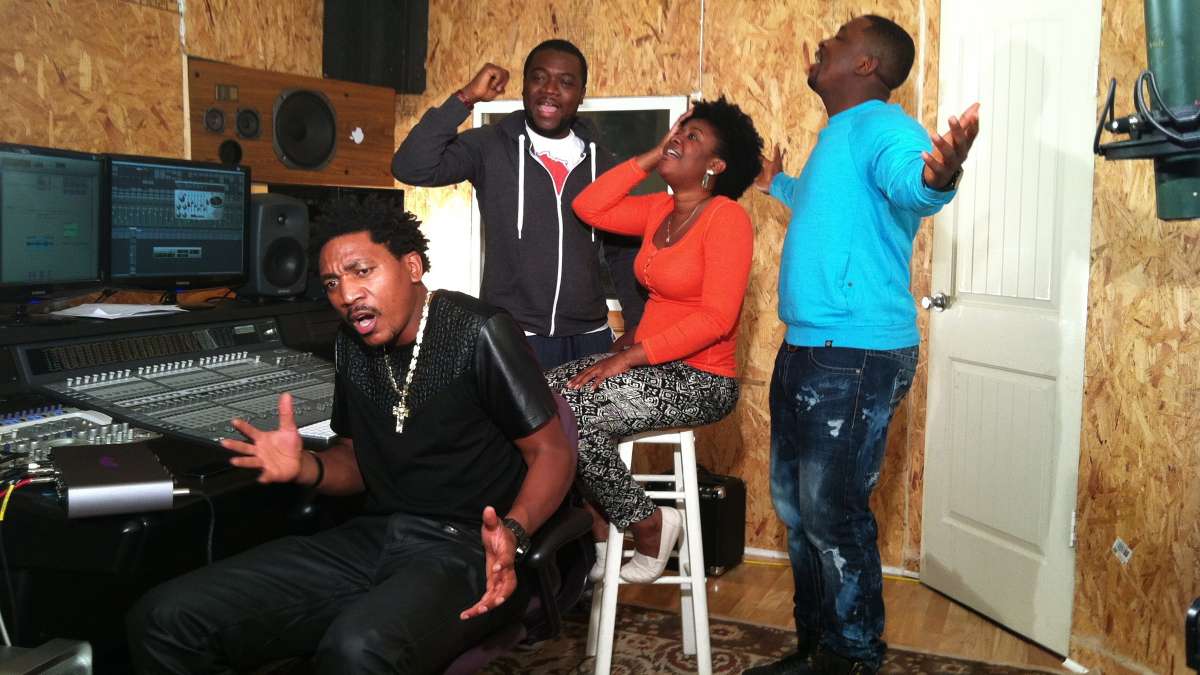Listen to these Philadelphia musicians create a song to ‘Kick Ebola’ out of Africa
ListenChillton “De Merchant” James is a Liberian-born musician who runs a community recording studio in Southwest Philadelphia.
It’s on the top floor of the nonprofit ACANA, or the African Cultural Alliance of North America. The neighborhood is a hub for thousands of West African immigrants around the region.
James’ main gig these days is behind the scenes engineering other people’s music, everything from gospel to R&B. But by early October, the reggae artist found himself humming his own tune, one that he couldn’t shake.
“It’s like, ‘Kick Ebola, kick Ebola out of Africa’…” he sings. “I’m still working on it. I haven’t played it yet, but it’s in my mind. That’s why I came running here to see if I could put something in the machine.”
As the soft-spoken James sings more of the melody, his voice transforms; its rawness and quivering tone fill the room. “Our mothers are dying, our fathers are dying” he sings. “Ebola go, go.”
Creating awareness, drawing support
James says it’s easy to feel helpless right now. Support doesn’t seem to be arriving soon enough, he explains, and he’s constantly bombarded with misinformation and confusion, especially on social media. That’s why he’s turning to what he knows, in hopes of spreading information and support.
“The only thing we can do to prevent and stop this deadly virus from spreading around, that’s the most important thing we can do, is create awareness,” he says.
So for the last two weekends, James has brought in some friends and music collaborators to help develop his concept for a song and lay down the tracks. “Sensitizing your hands, stay away from the infected, Ebola came to destroy,” he arranges to music.
“We are too beautiful, too precious to be dying like this,” says Sametta Tupee Morris, a backup singer and producer. “The more we sing, the more powerful we become.”
Morris has been thinking a lot about a dear musician friend who just died of Ebola, Alexander KoKo Anderson. She says the creative process is also providing a way to find inner strength.
“We are here but we feel the pains back home,” adds drummer Tsneh Harris.
“As a Liberian, you hate to see your country in a negative light,” says James Suah, who sings background vocals. During the weeks since the song production began, Suah has felt that sentiment grow not just abroad, but also in the U.S. and even around Philadelphia. “To me what it feels like is we’re not just fighting the virus, but we’re fighting the stigma.”
Chillton James agrees. He says even though the idea originated as something for Liberians, the song has turned into something more universal.
“My view is if we are not together, we are not going to stop Ebola from spreading,” he says. He goes on to sing: “Stop the blame games, put an end to this nightmare, whether you’re black or white, no racial discrimination.”
James is not alone in creating a song about Ebola. In fact, the outbreak has inspired a wave of music in West Africa and beyond, with the hope of many artists being able to bring clarity to how Ebola is spread, amid distrust and confusion, and also build support. The song “Ebola is here, Ebola is real,” for example, can be heard all over Liberian television and radio.
Chillton has two particular favorites, “Ebola in Town” and another one by JustPrince.
Morris says while there are many songs out there, it’s not enough.
“We need change,” she says. “We get a better understanding in music than people just talking.”
“Our brothers and sisters that are in the diaspora are coming back,” adds Harris, who explains that messages resonate more when friends, family and music fans hear familiar voices they trust.
“They have heard [our] voices.”
Enhancing the message
Just three weeks after James’ initial concept came about, the group was putting final touches on the song. James jumped around and kicked in rhythm as he wrapped up music tracks and tweaked lyrics.
But before the final mix began, Stephen Worjloh stopped in. He’s widely known across West Africa as “Big Steve” and is James’ mentor and musical icon. The two first met in the 90s, when Worjloh sought James out at a refugee camp in the Ivory Coast, after hearing a lot of buzz about James’ talent. James later spent about ten years as a musician in Norway before joining up with Worjloh and others in the U.S.
“He’s good, and the music is good,” James comments, after hearing the song.
But Worjlah, who’s produced songs for international public health campaigns, told them the song needed more edge and an “enhanced” message.
“There are a lot of Ebola songs out there, and they just say, ‘Ebola, Ebola, Ebola’ like they’re praising Ebola.”
James agreed, so he added in Big Steve as “the grandmaster” at the end. In a deep, chilling voice, he begins, “This is war. And it’s raw. Against mankind. And there’s no time. Calling all world powers.”
“Now this song is to tell you guys we are serious,” says Worjloh.
James described the process of putting the song together over the last three weeks as “small, small,” meaning it’s come together in little steps. He says they could always spend more time on it, making it even better, but the group feels an urgency to get their message out.
So how are they feeling about the final product?
“Oh, very excited,” says James.
“The more we listen to the song we get inspired,” says Morris.
“We feel so good about it as our way of contributing back,” says Harris.
Worjloh approves.
“That’s why I’m dancing!”
“I just want the world to hear this song and join us in the fight,” Morris adds.
James says they’re now working on a video to go with the song. The hope is to perform it live soon and join with other artists around the country and world, to expand their message and build more support.
WHYY is your source for fact-based, in-depth journalism and information. As a nonprofit organization, we rely on financial support from readers like you. Please give today.








